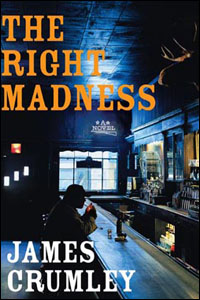Balls and Walnuts
more than you ever wanted to know
Damn you, Sughrue
 I’m ticked off at a character, C.W. Sughrue, and since he’s not my character, there’s not a damned thing I can do about it. See, I just finished James Crumley’s The Right Madness, Crumley’s most recent (and who knows, maybe his last) Sughrue novel. I’ve been with C.W. through The Last Good Kiss, The Mexican Tree Duck, and Bordersnakes, and even if he is one mean
I’m ticked off at a character, C.W. Sughrue, and since he’s not my character, there’s not a damned thing I can do about it. See, I just finished James Crumley’s The Right Madness, Crumley’s most recent (and who knows, maybe his last) Sughrue novel. I’ve been with C.W. through The Last Good Kiss, The Mexican Tree Duck, and Bordersnakes, and even if he is one mean bastard son of a bitch detective (C.W. likes his parents and objects to such aspersions), I still care about him. I wanted Crumley to leave C.W. in a happy place. He’s not in a happy place. He’s more damaged than ever.
Unless you’re a hardboiled/noir fan, the name Crumley probably doesn’t mean much to you. And if you’re not an HB/noir fan, I could tell you that lots of folks consider Crumley a latter day Chandler and that wouldn’t mean anything to you, either. Or that his character, C.W. Sughrue (“Shoog as in sugar. And rue as in rue the goddamned day”), is a latter day Philip Marlowe, if Marlowe popped amphetamines and did the occasional line of coke. But, like Marlowe, C.W. lives by a code: Family and friends are gold, and anyone who threatens them can and will rot in hell.
The first C.W. Sughrue novel, The Last Good Kiss, has an opening line that sings. Lots of HB/noir fans really dig this line, myself included.
When I finally caught up with Abraham Trahearne, he was drinking beer with an alcoholic bulldog named Fireball Roberts in a ramshackle joint just outside of Sonora, California, drinking the heart right out of a fine spring afternoon.
Seemingly, the story begins at the end: C.W. has been hired to find Trahearne, a novelist-drunk, by Trahearne’s ex-wife. But he takes on a charity case for a friend who wants him to find her runaway daughter, and soon C.W. and Trahearne are traipsing across the USA, ripping through their stash of booze, tobacco, and coke. And when that tale ends, the reader is still only halfway through the novel.
Over the course of these four novels, C.W. gets gutshot and left for dead, kills some baddies, does some drugs, runs afoul of the DEA and the FBI and I-don’t-know-how-many police departments, acquires a makeshift family, defends them from some mean sons of bitches, does some more drugs, kills some more baddies, gets betrayed more than a few times, and loses his family.
That last part, that’s the part that stings. The one thing that tied C.W. to humanity was his wife and adopted son, and now . . . And now Crumley is 68 and I have to pray he lives long enough to write another C.W. Sughrue novel. He’s had some weird health problems (which he discusses in this interview) so his survival is not a moot question. So I have to worry, will Crumley’s next novel feature one of his other regulars, C.W.’s partner Milo Milodragovitch? I like Milo, but I love C.W. Crumley has to write another Sughrue novel.
I can’t think of too many other fictional characters who have come alive for me like C.W. Sughrue. Sticking to the HB/noir stuff for the moment, there’s Martin Cruz Smith’s Arkady Renko. Chandler’s Philip Marlowe. John LeCarre’s George Smiley. (Yeah, not quite the same genre, but close.) And that’s about it.
What characters have come alive for you? And have you ever felt like this — dying for the author to write the next one, so that your character can get his ass out of a sling?
D.
Harry Dresden. Patrick Kenzie. Spenser. Lymond. Kinsey Millhone. Eve Dallas (although she’s mellowed a lot, so much of the urgency is gone). Used to feel that way about Anita Blake until she died (I know she didn’t–that’s just how I deal with it).
Lots of characters I connected with in stand-alone books, but I think it has to be a series to get that involved, or at least a book you re-read over and over.
Darla – I LOVE Eve Dallas! She is my favorite character in a book. Best book in that series for me is Conspiracy in Death, because the author reveals so much more of her personality in it.
My favorite author died a few months ago. He was working on the final book in a series of 12 before he passed away. I cried.
[…] It’s a fun book but it’s really not too deep. Based on my N of 1/2 a McCarthy book, James Crumley has a hell of a lot more to say and he says it with a much less affected style. I don’t like the lack of dialog quotes, the almost complete absence of speaker attribution, the dropped punctuation (McCarthy dont need no stinkin apostrophes!), the sentence fragments, the thick vernacular. Nevertheless, all of those pretentious quirks aside, NCfOM is a fun ride. […]